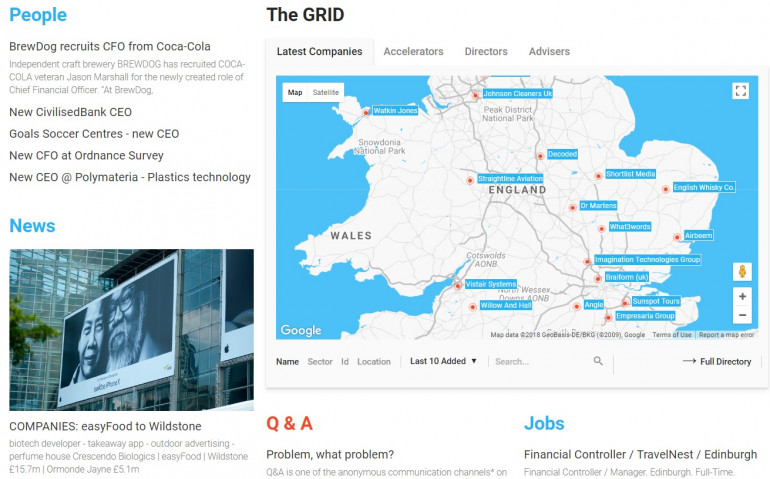Published by Directorzone Markets Ltd on February 1, 2016, 9:00 am in Knowledge, Market Info
Wednesday January 1st 2020

UK university spin-outs in decline? | Chinese chase UK innovation | Creative: #2 economic sector | Insurers invest in start-ups | UK banks: big 4 vs upstarts | 19 UK Unicorns | UK science parks | UK yacht makers | Start-up hotspots; Birmingham #2 | Tech & fintech investment up | Manchester funds founders | Northern powerhouse floats | AIM down in 2015 | Organic food online
Digest of news and trends in the GRID marketplace in January 2016.
UK UNIVERSITY SPIN-OUTS IN DECLINE?
Universities call the tune on spin-outs | Kiki Loizou, Sunday Times. 24 January.
Companies formed from research at Britain’s top universities are normally asked for at least 50% of the equity i.e. Oxford, Edinburgh, Imperial College London and Cambridge.
In America, an entrepreneur at a leading university such as Massachusetts Institute of Technology (MIT) parts with a maximum 5% of equity, and at Stanford in California the figure could be up to 10%. The institutions trust they will benefit through donations (and an image boost) should a venture flourish.
The more liberal approach seems to be working. Last year, Oxford created 10 spin-outs, up from eight in 2014. At Cambridge there were nine, up from five in the previous year, and Imperial has had eight in each of the last two years. Yet in 2015, MIT produced 28.
… Britain’s university spin-outs are in decline. A report from Barclays suggests that since the year 2000 there have been 1,110 ventures created from university-owned intellectual property. The most recent data from Spinouts UK shows there were just 40 in 2014 — down from 120 in 2001.
There have, of course, been many more firms started by students and postgraduates where IP is not a concern and a share of equity with the university is not necessary.
CHINESE CHASE UK INNOVATION
UK tech start-ups set for £500m Chinese fund boost | Hugo Greenhalgh, FT. 20 January
Cocoon Networks, a Chinese investment firm will launch a £500m, London-based venture capital fund to invest in European technology companies. It will seek out businesses that could be successfully imported back home and concentrate on start-ups in the fintech, biotech sectors on the UK’s creative industries.
Start-ups that are keen to move into China will be given additional help in navigating the country’s legislation and business laws.
Chinese investors have been increasingly active in the UK in recent years. Cha Li, founder and managing partner of iStart Ventures, a tech incubator and angel fund: “The Chinese economy is vastly in need of innovation which comes from either competition in the domestic market or from international inspiration,” “Chinese investors have started exploring opportunities outside of China, in order to grab hold of global cutting-edge technology as well as to diversify their portfolios. In light of this, London serves as the best hub in Europe.”
CREATIVE: #2 ECONOMIC SECTOR
Britain’s got creative talent - and it can put us on top of the world | Chris Blackhurst, Evening Standard. 20 January.
…. what is our second-biggest economic sector… behind banking …. Retail? Construction? Energy? Manufacturing?
It’s the creative industries, that amalgam of fashion, advertising, design, film, TV, publishing, music and art. In fact, when you include the bailout bill from the banking crisis, our creative firms may outstrip the banks, accounting for 5% of the UK economy, or almost £80 billion annually, and 6% of the job market.
…one that is growing three times faster than any other sector. …(a) sector in which we’re already a world leader and possibly number one, ahead of the US. However, mention creative industries to leaders in what they perceive as grander, more important industries and they will be condescending. Yes, they’ve heard of it but that’s about all they will acknowledge. It’s full of small enterprises, trendy folk, doing drawings and making pretty pictures. It’s not real, mano a mano, big business.
There are signs of change. There’s now the Creative Industries Federation and Creative England, which lobby for, and help, creative businesses.
INSURERS INVEST IN START-UPS
Insurers commit $1bn to tech start-ups | Oliver Ralph, FT. 19 January
European insurers such as Axa, Aviva and Allianz, along with MassMutual and American Family in the US and Ping An in Asia have all set up specialist venture capital funds dedicated to investing in start-ups that may be relevant for their core businesses. Analysts …say that interest has picked up sharply in recent months in a bid to stay competitive and harness big data analytics.
The latest deal will be announced this week, with Aviva and other investors putting £1m into APPYPARKING, an app that helps find empty parking spaces. Last year Generali bought full control of MYDRIVE, a UK-based telematics business.
Insurers have taken a wide definition of what might be relevant investments to make. According to CB Insights, between 2010 and 2015 just 13 per cent of investments were in insurance technology companies. “We are looking at technology that will be relevant in three to five years,” says Ben Luckett, managing director of Aviva Ventures, “especially around theinternet of things”.
Aviva opens ‘digital garage’ in technology push | Oliver Ralph, FT. 19 January.
Aviva established 2 “digital garage” sites in 2015: Hoxton Square, London and Singapore - dedicated spaces where technical specialists, creative designers and commercial teams explore, develop and test new insurance ideas and services which make financial services more tailored and accessible for customers. Andrew Brem …brought in to run Aviva’s digital strategy in December 2014 …manages about 100 people at the digital garage, from website creators to data analysts to games developers.
The industry is focusing on two areas:
1. Back-office systems, some built 30 years ago. Once fixed, insurers can use “big data” to take a comprehensive look at risks across the business.
2. Customers. For many insurers customer contact comes once a year — when the policy renewal is due. By measuring how people drive (through telematics) or their physical activity (through wearable devices) the industry hopes that it can persuade its customers to cut out risks and so push down the cost of claims. And if they cannot be encouraged to do so, at least the insurers will be able to price risks better. Aviva is developing a system that allows customers to see all their Aviva products on one screen, and is also cutting the number of questions that customers have to answer before buying a product.
UK BANKS: BIG 4 vs UPSTARTS
Carney fast-tracks upstart banks | Aimee Donnellan, Sunday Times. 17 January.
The government wants 15 new banks on the high street over the next five years. About four lenders have applied for bank licences, with another 20 in pre-application discussions with the Bank of England. Last year, ATOM BANK and TANDEM, two digital-only lenders were given full licences.
The banking industry is seeing a wave of new banks coming on to the scene, following the launch of METRO BANK in 2010. At the time, Metro was the first new retail bank in Britain for 150 years.
Small businesses prefer challenger banks to high street rivals | Martin Arnold, FT. 12 January.
There are about 5.5m business current accounts in Britain, which generated about £2.7bn of revenues in 2014.
The top-ranked lenders in a survey of about 12,000 small and medium-sized businesses were “challenger banks”, while most big banks were rated below average, according to a Financial Times analysis of the research to be published on Monday.
Top 10 UK banks for small business services (Business Banking Insight survey of more than 12,000 SMEs):
Handelsbanken (200 branches)
Co-operative Bank
Cater Allen
Santander (800 branches)
Yorkshire Bank
Danske Bank
NatWest
RBS
Bank of Ireland
Bank of Scotland
Handelsbanken, the Swedish lender, and First Direct, the online and telephone-based bank owned by HSBC, both had aggregate customer satisfaction ratings above 80 per cent. Spanish bank Santander …almost 70 per cent. The Co-operative Bank, which almost collapsed two years ago, also ranked highly, with almost 75 per cent.
While the big four banking groups — Lloyds Banking Group, Royal Bank of Scotland, Barclays and HSBC — have an 85 per cent share of the SME market, the research found they have relatively low customer satisfaction scores of about 60 per cent. Other lenders with customer satisfaction scores below 60 per cent included Ulster Bank, the Irish arm of RBS, First Trust Bank, and Leeds Building Society.
Competition and Markets Authority … inquiry into business banking last year. In its interim findings in November, the CMA found that challenger banks are struggling to gain market share from the big four, because businesses are slow to change their lender.
19 UK UNICORNS
Early 2016 British Unicorns:
ANAPLAN: cloud-based business planning software
SKYSCANNER: online travel site.
2015 and previously:
London:
FARFETCH: luxury online clothing retailer
SHAZAM: music discovery app
FUNDING CIRCLE: peer-to-peer lender
ASOS: online fashion company
ZOOPLA: property website
JUSTEAT: online takeaway delivery company
SPOTIFY: music service
SKRILL: online payments & money transfers
WONGA: payday loan company
TRANSFERWISE: peer-to-peer money transfer service
MARKIT GROUP: global, financial information and services company
VE INTERACTIVE : e-commerce services
POWA TECHNOLOGIES : commerce, mobile commerce and e-commerce services
RIGHTMOVE: online real estate portal.
Elsewhere:
FANDUEL: fantasy sports website
AO.COM: online retailer of household appliances
POKERSTARS: largest online poker cardroom in the world
Macmillan Dictionary BuzzWord (article first published on 4th August 2015).
In the business world, a unicorn (or unicorn company) has in recent times become the accepted description for a newly started company, usually no more than ten years old, which has come to achieve a valuation of $1 billion (about £590 million) or more.
The vast majority of unicorns are consumer-oriented, web-based companies, their entrepreneurial founders typically well-educated thirty-something males. Though unicorns are relatively few and far between, the UK, with its love of online shopping and high level of internet and smartphone use, seems to be particularly successful with them, producing seven of the 13 new unicorns in Europe during the past year.
SKYSCANNER: the UK's first unicorn of 2016 after raising $192m new investment | Lynsey Barber, City A.M. 12 January.
The number of VC-backed unicorns, largely fueled by startups and investors based in Silicon Valley, has fallen. The latest figures show just nine were created in the fourth quarter of 2015, compared to record highs of 23 in the previous two quarters. Several less than impressive tech IPOs … such as SQUARE and FITBIT have also helped fan the flames of tech bubble talk.
Jose Neves’s luxury goods website Farfetch helped many retailers survive the crash | Kiki Loizou, Sunday Times. 10 January.
Jose Neves founder of luxury fashion website FARFETCH sits in his London headquarters. In eight years, the 41-year-old has built Farfetch into an operation with 1,000 staff across 10 offices. It is valued at more than $1bn ….joined the unicorns last year thanks to a fund-raising round of almost £60m that took the firm’s total investment to more than £130m. Investors: DST Global, the venture fund run by Russian billionaire Yuri Milner, which has Facebook and Twitter among its portfolio companies; Index Ventures; Condé Nast.
Farfetch, like most of the nine British unicorns, has yet to make a profit. Sales reached almost £350m last year, a 70% annual increase. Staff numbers grew by 500.
#LDNTechWeek: UK “undisputed home of unicorns in Europe” | Kirsty Styles, Monday June 15th, 2015
A total of 17 of the 40 European tech companies that have achieved IPO or been valued at $1bn or more started in the UK, with fintech’s eight unicorns representing the largest sector.
The number of unicorns across the European region has grown 33% from the same time last year, up from 30 to 40 companies, making 2014 the most successful year since 2000. ….with the average valuation across all of these European firms now reaching $3bn. Perhaps not quite the fast investment or quick exit that some founders and investors might hope for, European unicorns require an average of $140m over nine years to pass the $1bn mark.
And far from being a young person’s game, the average age of entrepreneurs when they founded these companies was 35.
UK SCIENCE PARKS
Investors warm to UK science parks | John Murray Brown, FT. 12 January.
The UK’s largest portfolio of privately owned science parks (Best) has been bought by Angelo Gordon, a US private equity company, and Trinity Investment Management, a private UK property company in a £95m deal signalling renewed investor confidence in the UK science and technology sector.
UK science parks …traditionally have been seen as a risky investment because of the high turnover of tenants, and the failure rate of pharma and other science-based start-up tenants.
Best, or the BUSINESS ENVIRONMENTS FOR SCIENCE AND TECHNOLOGY NETWORK - the UK’s largest portfolio of privately owned parks - consists of:
EDINBURGH TECHNOPOL
HEXAGON TOWER in Manchester
KENT SCIENCE PARK, where GW Pharma and Novartis are both tenants
LANGSTONE TECHNOLOGY PARK in Havant
WILTON CENTRE in Teesside.
The five sites being sold were all originally owned by companies:
Wilton and Hexagon by ICI,
Langstone Technology Park was part of IBM.
About half the UK’s 100-odd science parks are owned by, or linked to, universities.
Birmingham’s INNOVATION CAMPUS used to be jointly owned by Lloyds TSB, Birmingham city council and Aston University. But since 2008, it has been wholly owned by the council.
Pochin’s, the listed property company, sold its interest in KEELE UNIVERSITY SCIENCE PARK in 2013.
In 2015 St Modwen sold its interest in CRANFIELD SCIENCE PARK to an international property company.
M&G; Investments, part of the Prudential, is selling its 50 per cent interest in OXFORD SCIENCE PARK. Co-owner, Magdalen College paid £18m to become the 100 per cent owner — the college’s biggest ever investment
West Sussex county council had bought the former Novartis campus in Horsham and has plans to build a life sciences centre there.
In November, GRANTA PARK, south of Cambridge, became part of Blackstone, after the US hedge fund bought BioMed Realty, a San Diego-based property fund that specialises in lab space for biomedical science companies.
The UK Science Park Association estimates 85 per cent of science park tenants are companies with fewer than 50 people.
Carl Potter of GVA property consultants, says part of the explanation is the rise in the number of start-ups founded by scientists laid off as big pharma companies have closed laboratories.
UK YACHT MAKERS
Big spenders abandon UK yacht makers | Peter Evans, Sunday Times. 10 January.
After years of super-sized growth, demand for luxury goods is slowing. Last year, the market increased 5% to €1.04 trillion (£770bn), a slowdown from 7% growth the previous year, according to the consultancy Bain. Yacht sales fell by 1%, the worst-performing sector alongside private jets.
Recessions in Russia and parts of the Middle East, as well as fears over China’s financial stability, mean even the ultra-wealthy are tightening their belts. The continued strength of the pound is making life even more difficult for exporters.
British superyacht makers …by no means an entirely bleak picture. The British industry still employs 4,000 people and leads the way in Europe since its biggest rival, Italy, suffered during the financial meltdown. And while the biggest boat builders may be in trouble, other parts of the industry are thriving — from marine kit manufacturers to training schools for crew. Companies that handle refits, which can include anything from a new Tannoy system to lengthening a yacht — are also performing well.
START-UP HOTSPOTS / BIRMINGHAM #2
A new entrepreneurial age has dawned thanks to support from universities, big companies and banks | Kiki Loizou, Sunday Times. 10 January.
Statistics to be released tomorrow by StartUp Britain suggest Birmingham was home to the highest number of new companies outside London in 2015. The area has focused on business support since the financial crash through funds such as Finance Birmingham, which has earmarked £90m for small and medium-sized enterprises. Research suggests the city’s office market offers the best value for money in Britain: an office in the business district is said to be cheaper than in London, Edinburgh or Manchester, with operational costs up to 55% lower than in the capital.
Data from Companies House shows that more than 600,000 businesses were launched in Britain last year, up from the record 581,000 in 2014. London had 196,146 new ventures. List of start-up hotspots:
- London
- Birmingham
- Manchester
- Leeds
- Edinburgh
- Glasgow
Experts believe Britain has entered a new entrepreneurial age as universities, big companies and banks continue to throw money at start-ups through incubator and accelerator programmes. Capital is easily accessible through the alternative lenders and crowdfunding platforms that have stepped in when banks have stepped out.
Emma Jones, who runs the small business network Enterprise Nation said local authorities have stepped up their support for small companies in recent times. The abolition of central programmes such as the Growth Accelerator and Manufacturing Advisory Service has meant local enterprise partnerships now have more of a role to play.
TECH & FINTECH INVESTMENT UP
UK tech sector raises $3.6bn venture capital in 2015 | Murad Ahmed, FT. 7 January.
British technology companies raised $3.6bn from venture capitalists in 2015, as strong investor appetite for London-based start-ups and fintech groups resulted in record levels of tech investment flowing into the country. …70 per cent more funding from VCs last year, compared with $2.1bn in 2014
London-based tech groups, which raised a total of $2.28bn, an increase of $1.3bn on the same period a year earlier. Since 2010, UK tech groups have raised $9.7bn, with London-based companies accounting for more than half of the national total.
However, the numbers continue to pale in comparison to the cash pouring into their Silicon Valley rivals. According to the US National Venture Capital Association, $35.7bn was invested in tech companies by US venture funds in 2014 alone.
One area of strength is fintech, where nimble start-ups are trying to disrupt the established business models of banks. It is believed that UK challengers have an advantage over Californian start-ups through their proximity to London’s financial sector. In 2015, UK fintech groups involved in significant funding rounds include
- EBURY, a group that helps small businesses trade internationally, which raised $83m;
- FUNDING CIRCLE, the peer-to-peer lender, which raised $150m;
- and WORLDREMIT, a money transfer group, which raised $100m.
MANCHESTER FUNDS FOUNDERS
Private equity finds rich pickings around Manchester | Andrew Bounds, FT. 4 January.
In north-west England …private equity groups are more likely to invest in companies still run by their founders, according to industry research. Manchester is rare for a regional UK city in having a cluster of funds based there. It also has the regional offices of several London-based firms, such as MONTAGU and ECI.
Companies such as PREMAITHA HEALTH, which has developed a test for Down’s syndrome, and the drug discovery business REDX, are recent listings from the north-west backed by local venture capital, in their case ENTERPRISE VENTURES.
Firms in north-west England did 24 deals with founders in 2014, two-thirds of the total transactions in the region. Some 30 of the 37 in total were “primary” deals, the first significant finance the companies had raised. Across the UK as a whole, just 38 per cent were with a founder and 75 per cent of deals were primary.
NORTHERN POWERHOUSE FLOATS
The northern powerhouse needs more floats | Andrew Bounds, FT. 3 January.
In 2015, just a fifth of the money raised in UK floats went to companies from the (Northern) region, down from a quarter in 2014. …..10 companies from the North raised £2.07bn through listings on Aim and the main London Stock Exchange market in 2015. That was down from 15 IPOs the year before, which raised £3.33bn.
The north still claimed the second largest flotation of 2015; Manchester-headquartered AUTO TRADER raised £1.59bn in March and was bested only by London-based WORLDPAY, which raised £2.48bn in October.
The other northern main market IPOs during 2015 were
- DFS FURNITURE of Doncaster, which raised £220.8m in March;
- Cheadle-based travel agent ON THE BEACH, which raised £96m in September;
- Ashton-under-Lyne’s REVOLUTION BARS GROUP, which raised £86m in March and
- Sunderland-based ScS GROUP, which raised £35.7m in January.
Five Aim listings by companies based in the North of England generated a total of £41.8m in 2015.
On one measure the north has progressed. The latest FTSE 250 list includes 29 companies based there, up from 20 a year ago. POLYPIPE, the maker of plastic piping, is on the reserve list of companies that just missed the cut. The latest to join is ASSURA. The Warrington based group builds doctors’ surgeries and rents them out to the National Health Service. Its market capitalisation has risen from £150m to £900m in three years.
AIM DOWN IN 2015
Aim left bruised by a lack of new issues | John Murray Brown, FT. 4 January.
Aim the UK’s junior stock market was hit by:
-- a slowdown in fresh issues - the market attracted 39 initial public offerings, raising roughly £600m compared to 85 IPOs in 2014. The London Stock Exchange …pointed out the clutch of IPOs in 2015 saw their shares rise on average 9 per cent at a time when both the FTSE 100 and 250 recorded falls.
-- the loss of mining companies and oil and gas explorers. The end of commodity boom saw 12 mining companies and 11 oil and gas companies quit as investors lost their appetite for smaller speculative resources stocks.
-- the departure of Chinese companies after nominated advisers withdrew support. …45 Chinese businesses left on Aim
ORGANIC FOOD ONLINE
Farmers’ markets plough online field | Emma Broomfield, Sunday Times. 3 January.
… growing number of independents turning to the internet to compete with the supermarkets. According to the Soil Association, £1.8bn was spent by shoppers on organic goods last year, with £216.3m worth bought online. While this is just a tiny proportion of the £177.5bn grocery industry in the UK, Lee Holdstock at the association believes the trend is a sign of the growing appetite for technology that enables shoppers to go local.








